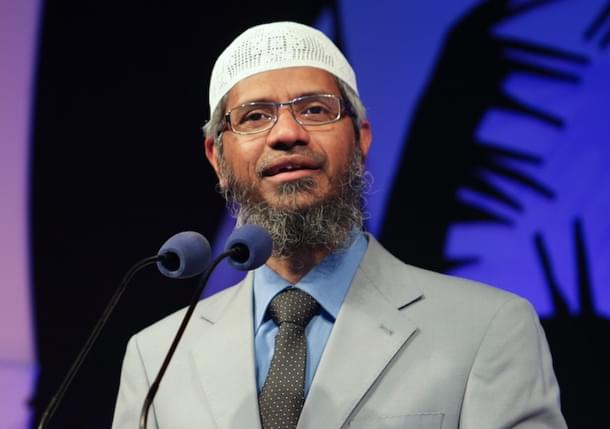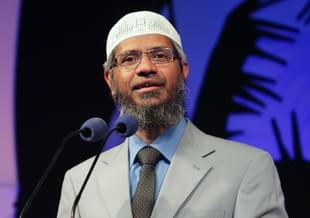Culture
Zakir Naik And Islamist Propaganda In India
Aravindan Neelakandan
Jul 06, 2016, 07:13 PM | Updated 07:13 PM IST
Save & read from anywhere!
Bookmark stories for easy access on any device or the Swarajya app.


What is needed is an open, strong, and viable alternative from within Islam that can combat the menace of radical Islamism thoroughly.
Media reports in the aftermath of the terror strike in Dhaka claimed that among the people who inspired the terrorists, one was the Mumbai-based Islamic preacher, Zakir Naik.
Naik is notorious for justifying jihadi terror attacks openly, refusing to condemn them, and providing ridiculously contrived justifications for the discriminatory practices of Islam.
Sample this clip, where Naik encourages suicide-bombing in a matter-of-fact way:
Because of harbouring and expressing such views, Naik is banned from entering the United Kingdom and Canada.
However, in India, Naik enjoys complete freedom to propagate his bigotry and totalitarian brand of Islam. Not only that, he commands fervent support from some quarters, as this India Today tweet makes clear:
Hyderabad #ISIS module chief influenced by Zakir Naik: Reports
— IndiaTodayFLASH (@IndiaTodayFLASH) July 6, 2016
One reason for Naik’s popularity among a section of Muslims is his unabashed participation in Islamic proselytisation and indoctrination. Today, in light of the rise of digital networks, global indoctrination has become more effective and decentralised. Preachers of radical Islamism, for instance, run transnational TV networks.
Two-dimensional Islamist preaching
Radical Islamist propaganda in India always takes these two forms:
a) An outer interface with non-Muslims, which is deceptively benign but logically inconsistent
b) A hardcore Islamist kernel
The deceptive outer layer usually exhibits these features:
- It tries to fit Hindu scriptures into the Islamist model. Vedas, Upanishads and the Gita are text-tortured and quoted to show that idol worship is prohibited in Hinduism as in Islam. In South India, the argument is laced with the Aryan invasion angle. ‘Brahminical vested interest’ is cited as the reason for the contamination of the original religion with ‘idol worship’. At times, even a Jew-Aryan connection is implied.
- It says that the cruellest of Islamic rulers in India, including, and in particular, Aurangzeb, were actually just and kind towards Hindus. They buttress their argument with Marxist apologist interpretations of Islamic destruction of Hindu temples. If one heard Zakir Naik and Professor Romila Thapar on the destruction of Hindu temples by Islamic invaders, one would be hard put to distinguish one from the other.
- The Islamist argument also turns to modern Indian history and presents the Jamaat-e-Islami stand against the partition of India as patriotic. While glossing over the collaborative role of the Muslim League with the British, select anecdotes of Hindu-Muslim bonhomie during the Khilafat movement are presented as the very soul of the Indian freedom movement.
- The Khilafat movement is also used as an ideal opportunity to inform Hindus about the glory of the global Caliphate and how Gandhi considered the early Caliphate as the ideal rule of law.
- Hindutva movements are also blamed for terror attacks and ‘Hindutva-Zionist conspirators’ are blamed for framing innocent Muslims for terrorist activities.
- All Islamist practices from the donning of the veil to stoning for adultery are defended, employing the usual tactics of equating Islamist generalisations with Hindu exceptions.
On the other hand, the features of the hardcore Islamist kernel are:
-It rejects evolution and twists modern scientific discoveries and says Koran exhibits a knowledge of them, thus proving that it is a text from the Almighty.
- It justifies terrorism. For example, Zakir Naik once refused to term Osama Bin Laden a terrorist, and even refused to condemn him.
- 9/11 is explained as retaliation against the ‘great Satan’ and also blamed on a Zionist conspiracy. In India, this Zionist conspiracy becomes a Hindu one, like in the case of the 26/11 massacre in Mumbai, for which ‘Hindu terrorists’ were blamed. While the 9/11 Zionist conspiracy has no takers in the Western mainstream discourse, in India we saw mainstream politicians, like Digvijay Singh of the Congress, join hands with Islamists just for their politically vested interests.
- It justifies Islamist terrorism, including suicide bombing. For example, Zakir Naik states that suicide bombing is acceptable “if the situation demands, like in Palestine”. In the case of Kashmir, the Islamist position is always calling for an “independent Kashmir”, even though it is well known that it is a step towards aiding the annexation of the state to Pakistan.
- It glorifies the Saudi state and strongly encourages a theo-spiritual colonisation of Indian Islamic psyche by the Saudi brand of Islam.
On the whole, radical Islamist terrorism is the fruit of the long-term labour of virulent theological Islam and political Islam. While Western countries like the UK are taking steps by arresting the theologians of virulent Islamism, the reverse is seen in India.
India too, has efficient law-enforcing officers who could identify virulent elements and make them ineffectual and help the community against falling prey to them. Insurgency expert EM Rammohun makes the following penetrating observation while discussing India’s ‘Internal Security Architecture’:
...all the Indian Muslim fundamentalist organisations like the JUH, the JEI (Jammat e Islami), the TJ and the AH should be penetrated and any violent plans neutralised. This will have to be a continuous professional battle. All this is possible only if the political parties become professional and do not treat the Muslim community as a vote bank.
An India Today cover story from 2008 identified the former Deputy Inspector-General of Gujarat Police, DG Vanzara, as one of the officers who had mastered this approach of neutralising terror modules. It said:
How to identify terrorists without hurting the community-recruitment aspect for terrorists- is a challenge before law enforcement officials. One officer who had mastered this technique after acquiring sound knowledge of the working of the Wahhabi tanzeems was Gujarat Police DIG D.G. Vanzara, who was in-charge of the state Anti-Terrorist Squad (ATS).‘Desi Jihad’, India Today, 31 July 2008
Another approach is suggested by the legendary Director General of Police for Punjab, KPS Gill, who defeated the Pakistan-sponsored insurgency in Punjab. He states:
What most frightens bigots and fundamentalists across the world is the progress of science which destroys the irrational myths that underpin the cosmology of religions, and puts the power of knowledge into the hands of the people, robbing the professional interpreters of the faith of their cabalistic powers. This, then, is the weapon that will secure the eventual victory of reason and science over dogma and violence.‘How to win the war?’, Outlook, 07 Feb 2005
An effective solution is one where the government could create a council of Indic-Islamic scholars to present an Islam that is both authentic and encouraging of a dialogue with the men and women of science and other spiritual traditions.
In this connection, Vedantist Frithjof Schuon (1907-1998), also known as Isa Nur al-Din Ahmad, provides a framework. In his book Understanding Islam (1963), he calls for a feminist understanding of the Quran.
The wisdom of nature is to be found over and over again affirmed in the Quran, which insists on the ‘signs’ of creation for ‘those endowed with understanding’, and this indicates the relationship between nature and gnosis; the vault of heaven is the temple of the eternal Sophia. The same word ‘signs’ (ayat) also designates the verses of the Book; like the phenomena of nature, which is at once virginal and maternal, they reveal God as they bring forth from the ‘Mother of the Book’ and are transmitted by the virgin spirit of the Prophet. … The diversity of religions and their equivalence in respect of what is essential is due- according to the most intellectual Sufi perspective- to the natural diversity of the collective receptacles; each individual receptacle having its own particular Lord, the same will be true of psychological collectivities.
This passage shows the kind of potential that exists within Islamic traditions to have a serious, sincere and productive dialogue with various Indic Darshanas, like Sankhya, for example. There can also be an understanding of theo-diversity and the need to preserve it from an Islamic point of view.
It is interesting to see that a pioneering effort in this direction was made by the Rashtriya Swayamsevak Sangh (RSS) as early as 1988.The Deendayal Research Institute (DRI) brought out a special issue of their journal Manthan with a focus on Sufism. It discussed “the influence of Sufism on Indian life thought and culture”, as also the works of Farid, Amir Khushrau, Rahim, Ras Khan and Bulle Shah. The magazine discussed “how Sufism integrated Perennial Philosophy with Islam”.
The continuation of this legacy was reflected in Prime Minister Modi’s inaugural speech at the World Sufi Forum. He pointed out the engagement of Islam with “diverse civilizations - ancient Egypt, Mesopotamia and Africa; the Persian, Central Asian and Caucasian lands; the region of East Asia; and, with Buddhism and Indian philosophy and science’. Modi was nearly echoing the words of Schuon when he spoke at the Sufi forum about the ‘wisdom we learn in the perfect balance and harmony that exists in the vast diversity of a forest”.
The need now is to create an educational system and a vast, decentralised network of forums to discuss and disseminate these ideas and create platforms for genuine interactions between Muslims and Indic spirituality and science. Only when we create such platforms and centres of learning would strong voices from Islam be able to come out—not as a meek apology for the acts of terrorism but as a strong, viable alternative that can combat the menace of radical Islamism thoroughly.
Image credits: Maapu/Wikimedia Commons
Aravindan is a contributing editor at Swarajya.





